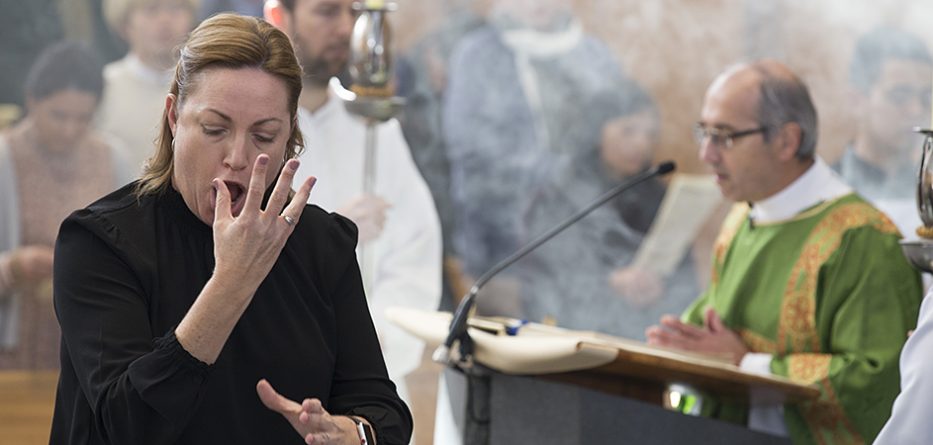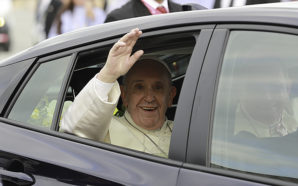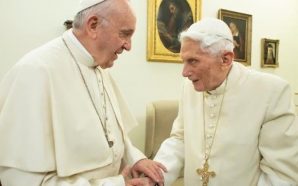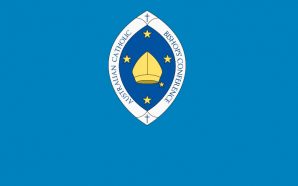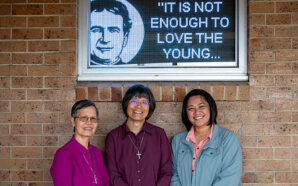23 September is International Day of Sign Languages. To celebrate this year, Ephpheta Centre staff Pat and Donovan interviewed 4 people from our community. We asked them about their experience of Auslan and how Auslan has impacted their faith development in the Catholic Church.
Thank you to Stephen, Robert, Mary and Mary for being involved. Thanks to all the Ephpheta team who helped to make this video.
Happy International Day of Sign Languages!
Pat: When you were growing up, when did you first start using Auslan – Australian Sign Language?
Mary Cook: I did not start using Auslan when I was little. I first started using Irish Sign Language when I was 5 years old. I was fluent in Irish Sign Language and I enjoyed using it. There were lots of laughs. When I was about 14 years old, my school decided to ban the use of Sign Language in classes. I was dismayed. It was hard trying to follow what is going on and there were communication breakdowns. The new communication was slow and cumbersome. I was lucky that I was not allowed to use Sign Language for only two years before I left school.
I went to the Deaf Society and I was shocked to see so many staff members there using predominately fingerspelling. I had to ask other people what they were saying. I couldn’t follow all the fingerspelling! Over time, I started to be able to follow fast fingerspelling. That is how I started to learn Auslan and use it.
Pat: When you were growing up, when did you first start using Auslan?
Mary Profilio: When I first went to my school, we used Oralism for communication. We were not allowed to use signs for communication. Despite that, we still used some basic signs like “Toilet” and “Drink” signs and I didn’t realise these basic signs are part of the Australian Sign Language!
Pat: What did you mean, using these signs, “Toilet” and “Drink”, Mary?
Mary P: I meant that these signs are not gestural or mime based but actual Auslan signs. I didn’t realise these signs, “Toilet”, “Drink” and “Mum” are part of the Auslan vocabulary. I was raised as an Oral person which means I used my voice and mouth to communicate. Every time there was a school break or recess, we went to the playground and we secretly used Auslan with my friends. Again, I didn’t realise these signs are proper signs. I always thought they were very basic signs. I grew up being an Oral person in my whole school years and it was hard because the communication wasn’t natural.
Until I met Pearl Beath, a famous deaf Auslan user. I felt awful I could not fully understand her because she was a fast fingerspeller! I had to communicate with her by writing on pieces of paper. Two deaf people communicating by paper and pen. I felt stupid. So, I learnt Auslan in order to communicate with Pearl properly. This is when I realised I am using a fully-fledged sign language, Auslan. Now I am comfortable in using Auslan. It is my natural language. I am very happy in using Auslan for communication.
Donovan: What impact did Auslan have on you as a Catholic person?
Robert B: Well when I was a much younger person, when I went to Mass, the service was conducted in Latin. The priest talked in front of the altar and with his back facing the audience and did not use Auslan at all. When the Mass services changed its format to English and the priests facing the congregation, this is when some of these priests realised the use of Sign Language. Some of these priests learned sign language so they can sign their homilies. It was a very comforting experience and I was able to ask questions and get answers back from these signing capable priests.
Donovan: That is great!
Mary P: When I was at school, we had Masses and they were normally spoken in English. I had no idea what was being said. All of us had no idea what was going on. We could not hear and follow the spoken English. We had Mass on Sundays and three times during the week. We just accepted it was normal. We did not know about accessibility way back. We just never thought asking for support in understanding Mass services! Every time I went home to see my mum, she will always go through hymns and prayers for example and tell me what was going on. We simply did not have access and it was very hard for us to follow what is happening. We never complained and we were just naive.
Stephen: In the Catholic Church, I find the biggest impact was having access in the church, especially during Mass services and Catholic retreats. It is great to be able to communicate in Auslan.
Donovan: In your life in the Catholic Church, what changes have you seen?
Robert: Okay, nowadays, the Church has provided different types of access, such as Auslan interpreters as there are decreasing numbers of Priests being able to use Auslan. We were able to watch online videos in Auslan especially this year in the light of COVID-19 situation. Use of Auslan in online Catholic services was so enabling for us, deaf people. I felt so empowered. Having interpreters nowadays is absolutely a positive experience for us.
Mary C: When I was raising my young children, I did not go to Catholic Mass services or the Ephpheta Centre. When my two young boys were grown up and left school, I had more time and I was able to attend Mass services. I could see differences over the years – extra use of Sign Language, extra Interpreters. Having an Auslan interpreter made the experience much more comfortable and I was able to understand what was going on.
Stephen: What I have seen in the Catholic Church, they have a good understanding of our deaf community needs and the deaf people’s needs. They made the experience more accessible.
Donovan: What do you mean by the Church being more accessible?
Stephen: Through Mass services, the use of Auslan interpreters make it much more accessible so we could follow fully what is going on.
Donovan: So the use of interpreters is very important, so we deaf people can follow what the priests are saying, for instance, the celebration of Mass.
Happy International Day of Sign Languages!
The Parramatta Catholic Foundation proudly supports the Ephpheta Centre, which offers access and support to those who are hard of hearing and deaf. Many rely on the Ephpheta Centre for its sacramental programs, pastoral care and social support. The Ephpheta Centre is also considered another family and home. It is a place of welcome, hope and acceptance.
We invite you to celebrate inclusion by giving a gift to support the Ephpheta Centre.




